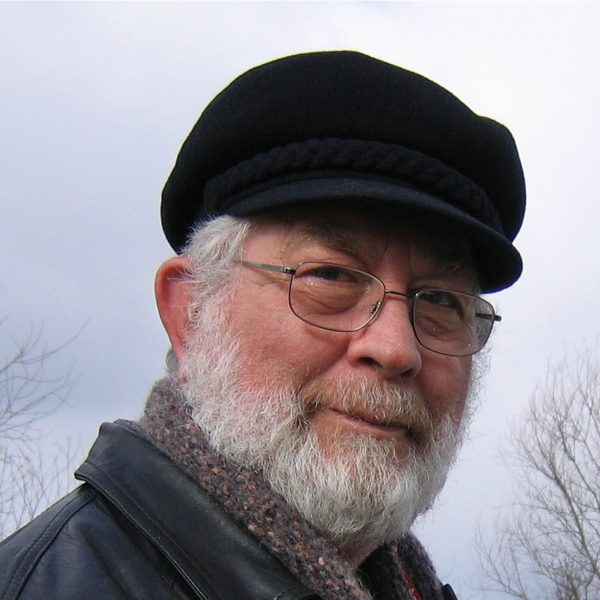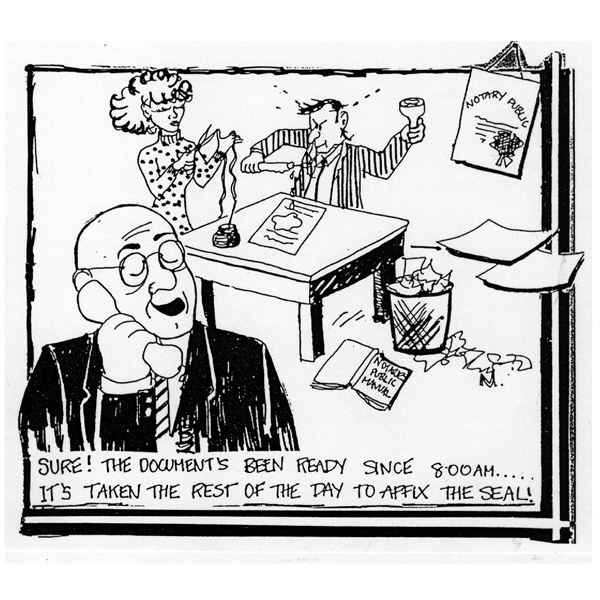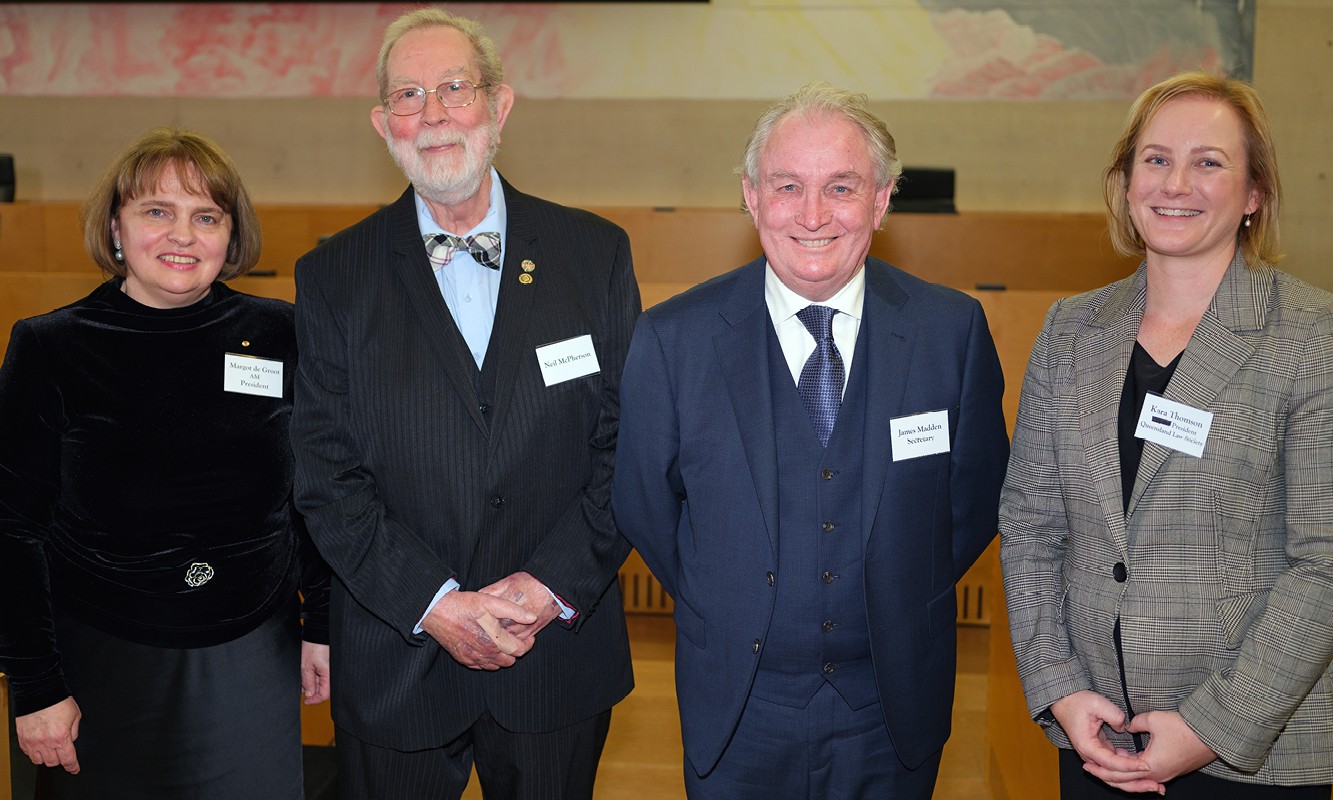As of this year, the Society of Notaries Queensland has notched up a century of service.
However, the role of the notary public goes back much, much further.
It actually developed from the activities of scribes in Roman times, and eventually notaries became independent officers whose certificates and seals were awarded recognition as a public act in the same way as a document under the seal of a court.
With the decline of the Roman Empire, the emperor of the Holy Roman Empire – as successor to the Roman emperors – assumed the power to appoint notaries.
Notaries were virtually unknown in England until the 13th Century. In 1279 the Archbishop of Canterbury was authorised by the Pope to appoint notaries. Following the English reformation, parliament transferred this power to the Crown.
The Ecclesiastical Licences Act 1533 created the Court of Faculties under the Archbishop of Canterbury, to appoint and exercise disciplinary powers of notaries. In 1801, parliament passed the Public Notaries Act and therefore the role of notaries was primarily the preparation and authentication of instruments to be used abroad.
Notaries were originally officers of the civil and canon law, but by way of the Ecclesiastical Licences Act 1533, the power of Rome to appoint notaries was abolished and the appointment process then stemmed from the ecclesiastical arm of the English court system. The Court of Faculties still appoints notaries in Britain and other parts of the Commonwealth where local legislation does not exist, for instance Papua New Guinea, Jersey, Guernsey, Gibraltar, New Zealand and of course, Queensland.
A notary public is an officer of the law and the appointment of Queensland notaries has been made by the Court of Faculties for over 100 years.
The function of Queensland notaries includes the important legal function of authenticating and giving legal effect to various documents. This includes:
- the attestation of documents and certification of their due execution
- administration of oaths
- witnessing affidavits and statutory declarations
- certification of copied documents
- noting and protesting bills of exchange
- the preparation of ships’ protests.
The power of a document (executed in Queensland) in a foreign country is demonstrated by the fact that the mere production of a document signed or sealed by a foreign notary is recognised by English courts as evidence of the subject matter of that document.
A (1987) cartoon depicting notaries and the secretary of the Society of Notaries Queensland at the time, George Walters.*
An affidavit verifying the signature of a foreign notary is unnecessary. However, generally a document signed off by a notary will, under the Hague Convention, require that the signature and seal of the notary be certified by a proper government department, such as, in Queensland, the Department of Foreign Affairs and Trade.
Those countries signatory to the Hague Convention normally require what is called an apostille to be attached to the document, or, for countries such as China which may not be a signatory to that convention, a certificate of authentication.
Documents executed in Queensland to be used in the foreign country include but are not limited to:
- Notarial certificate of authenticity of documents issued by government departments, corporate regulators, courts, universities and similar institutions
- Powers of attorney – both general and special forms – to authorise a person to act on behalf of another
- Statutory declarations regarding a range of matters
- Documents regarding property transactions
- Documents regarding estate matters
- Documents to be filed in a court of law.
The Court of Faculties is administrated by Mrs Morag Ellis QC, who is the current Master of Faculties, appointed in June 2020.
The Council of the Society of Notaries Queensland meets regularly to handle day-to-day matters involving the Society and the appointment process and recommendations to London. The Society may or may not recommend an applicant to London as a suitable candidate to receive a commission but, if so, and that candidate is accepted by the Court of Faculties (and suitable documentation tendered), then that person will be sworn in by a justice of the Supreme Court, District Court or Anglican Archbishop in Queensland, and then receive their commission (known as a ‘parchment’).
The Court of Faculties exercises regulatory power over all notaries in Britain, Scotland, Wales and those overseas jurisdictions already referred to. There have been instances when notaries who have had their commissions revoked for matters pertaining to dishonesty (or been found not to be a ‘fit and proper’ person to be a solicitor) have, in turn, been found not fit and proper to be a notary public.
“It has always been traditional that the standard of the probity for a notary is very high and it is this feature that prompts governments and individuals throughout the world to rely on notarial certificates. Indeed, the certificate of appointment by the Archbishop of Canterbury clearly states the appointment requires the appointee to observe those standards.”
Donald Seawright1
The appointment of a person as a notary is a senior appointment. Notaries basically are able to certify documents that are to be used outside Australia, which will be accepted as valid on the face of that document, once the notarial act of the notary takes place (being the signing and sealing of that document).
*This article reflects the Society of Notaries Queensland as at 2022, and has been adapted, modified and amended from an earlier article. The original article entitled ‘Notaries Public’ appeared (along with the cartoon) in the August 1987 edition of ‘The Proctor’ (Vol.7 No.7), at which time QLS Proctor was a monthly newsletter publication.
Neil McPherson is a former president of the Society of Notaries Queensland. James Madden is the Society’s secretary. The authors wish to acknowledge Gary Fulton for his input and assistance.
Footnote
1 The Queensland Notary by Donald Seawright 2012 pages 45 to 46.














One Response
I remember George Walters well & trust that he will be formally recognized at the forthcoming celebration. I also suggest that a special commendation & formal recognition be made to Don Seawright for his untiring contribution to the Society.